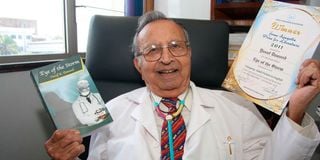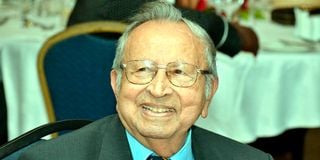Premium
Aesthetics of empathy in Dawood’s writings

Dr Yusuf Kodwavwala Dawood displays his book "Eye of the Storm" during a past interview with Sunday Nation.
The death of Yusuf Dawood last week robbed us of an author who had influenced Kenyan literature in three fundamental ways.
One, in his Surgeon’s Diary, a column that he ran regularly in the Sunday Nation for long, Dawood almost single-handedly sustained what grew to be a genre of literary journalism that simultaneously transcended the print newspapers.
Indeed, few people would have read his novels had he not penned the column as long as he did.
Second, Surgeon’s Diary allowed many Kenyans to peep into the medical struggles that many of Dawood’s characters, often fictionalised versions of real people, endured.
These characters, mainly drawn from the aspiring middle class, allowed Kenyans to encounter aspects of everyday struggles of a lot privileged in socio-economic and political terms, in ways distinct from the main themes of political liberation or socio-economic existentialism of our poorer kindred that had dominated the writings of other Kenyans.
Looking at Dawood’s literary journalism in the Surgeon’s Diary, his novels and memoir – Nothing but the Truth – and his extensive involvement in charity as a Rotarian, it is conceivable to sum Dawood’s literary legacy as a well-weaved aesthetic of empathy. One could go further and argue that Dawood’s writings had little else by way of themes – except empathy as a humanising force in us.
Third, and perhaps most important, Dawood’s writings often triggered the curiosity of many of his readers to explore the archive of South Asian writings in Kenya. Personally, it is unlikely that I would have joined the academy had I not read, with enthusiasm, Dawood’s Yesterday, Today and Tomorrow, The Price of Living, and Water Under the Bridge, on which I later wrote my graduate dissertation.
The shimmering elegance of Dawood’s style, such as it was, formed the basis for my later pursuit of doctoral studies in which I read more of his writings, alongside those of the more accomplished and globally acclaimed Moyez Vassanji, to formulate an argument about how the tensions of immigrants impeded South Asians’ reckonings with contradictions and paradoxes of that often romanticised notion of homeliness, and subsequently rendered perpetual mobility as a more attractive option.
In fact, it was something of an irony that, having come from England to practice medicine in the dying days of colonial Kenya, it was to England that he would return at the age of 90, to be closer to his adult children who had established themselves there.
Quintessential postcolonial author
In this respect, Dawood was a quintessential postcolonial author and subject, one who left his ancestral land to pursue the opportunity for professional training in England, within structures of power and knowledge that centred Europe, and later came to Kenya to launch a medical career in what was then a part of the British empire.

The late Dr. Yusuf Kodwavwala Dawood. The death of Yusuf Dawood last week robbed us of an author who had influenced Kenyan literature in three fundamental ways.
There is scant information on what really drove him to settle in Kenya, but it is possible that he had read about the many South Asian medics and paramedics who had established clinics in urban and rural Kenya, something that went on well into the late post-colonial period when many of the medical consultants in rural Kenya were Shahs, Amlanis, and Patels – at least in the North Rift and Western belt of Kenya, where I grew up.
Not only did these – and other professionals – counterbalance the then widely entrenched stereotype of South Asians as profiteering retailers; they were also the preferred category of affiliation for Dawood, who prioritised his fraternal belonging to other medics and fellow philanthropists, the Rotarians, above his South Asianness.
When I first met Dawood at Nairobi Hospital back in 2001, I asked him what he generally thought about his place in Kenya’s literary landscape.
Then, scholars of minority and national literature in postcolonial discourses were immersed in debating the usability of multiculturalism as a possible philosophical approach to appreciating racial diversity while pursuing national and transnational identifications.
South African Desmond Tutu’s notion of the rainbow nation, at least the phrase, was all the rave in many commentaries about possibilities of racial coexistence even within nation-states still smouldering from embers of racial hatred.
Of course, Kenya was nowhere near South Africa in that sense, but the idea that South Asians and other Kenyans could relate more closely than history and culture had so far allowed was a latent concern.
Power and privilege
Hence, asking Dawood how he viewed himself as a Kenyan author intended to elicit his views about what was then an ambiguous concern with how race relates to power and privilege, sometimes bestowing benefits to generations simply because their ascendants had earlier rigged the material system in their favour.
Dawood hesitated to view himself as an advocate of sorts of South Asians in Kenya, choosing instead to be associated with moral-intellectual leadership that literary writers, regardless of their racial belonging, are known for.
Whether that was a political answer or not is hard to tell; after all, I was young with little discernment, purporting to conduct an academic interview with an old hand who easily quoted Somerset Maugham, Dickens and Naipaul wherever I posed questions about his style.
He extolled the virtues of multiculturalism – before other critics later unmasked it as apartheid in other words – and suggested that if we all became multicultural, the so-called Asian Question would not arise in Kenya and the region.
That, he added, would allow us to probe deeper into our inner selves and show greater empathy to those among us who face up to their struggles, even when these sprung from their little failings, à la Gogol.
That could explain why, in his writings, Dawood was concerned with portraying the disappointments and triumphs of life; with characters who could grieve or desire as circumstances allowed, and those who either recover from sickness by some rugged fortitude or, rejecting Dylan Thomas’ counsel, slide quietly into that gentle night.
I met Dawood a few more times, the last one at the Muthaiga Country Club around 2018, where I had accompanied my bosses, Masumi Odari and Makau Kitata, to negotiate ways of relaunching the Yusuf Dawood Prize for Literature for the best student of literature at the University of Nairobi.
Initially, an annual affair, the Yusuf Dawood Prize for Literature had somewhat slackened due to bureaucratic labyrinths at the university.
Having dispensed with the matter of the award, Dawood mentioned his impending relocation to England partly because of the strains of age, but mainly because Marie, his loving wife and central character in many of his writings, had relentlessly wanted to go away.
When I woke up to the news of his death, last Sunday, I found myself thinking fondly about an amiable man whose works transformed the surgical theatre into literary ones, whose fiction radiated tempered emotions, with enough love and desire to heal the pain and trauma of disease.
None of his works, in my view, could provoke raucous laughter; but all his works merely elicited endless smiles in doses that made laughter unnecessary. Go well, Dawood.
Siundu teaches at the University of Nairobi





